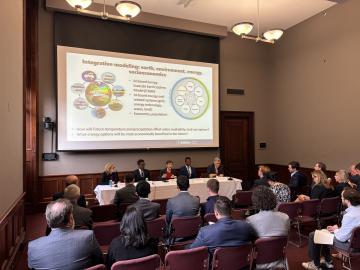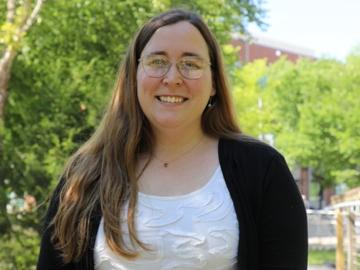
Filter News
Area of Research
- Advanced Manufacturing (2)
- Biology and Environment (30)
- Biology and Soft Matter (1)
- Computational Engineering (1)
- Computer Science (1)
- Energy Science (23)
- Fusion and Fission (18)
- Fusion Energy (11)
- Isotopes (20)
- Materials (22)
- Materials for Computing (2)
- Mathematics (1)
- National Security (14)
- Neutron Science (6)
- Nuclear Science and Technology (28)
- Nuclear Systems Modeling, Simulation and Validation (2)
- Quantum information Science (7)
- Supercomputing (45)
News Type
News Topics
- (-) Advanced Reactors (25)
- (-) Cybersecurity (17)
- (-) Exascale Computing (52)
- (-) Isotopes (38)
- (-) Nuclear Energy (85)
- (-) Quantum Science (58)
- (-) Space Exploration (23)
- 3-D Printing/Advanced Manufacturing (89)
- Artificial Intelligence (92)
- Big Data (62)
- Bioenergy (84)
- Biology (100)
- Biomedical (53)
- Biotechnology (28)
- Buildings (50)
- Chemical Sciences (48)
- Clean Water (30)
- Composites (21)
- Computer Science (153)
- Coronavirus (30)
- Critical Materials (17)
- Education (2)
- Emergency (4)
- Energy Storage (64)
- Environment (164)
- Fossil Energy (7)
- Frontier (45)
- Fusion (47)
- Grid (54)
- High-Performance Computing (93)
- Hydropower (12)
- Irradiation (2)
- ITER (7)
- Machine Learning (51)
- Materials (87)
- Materials Science (89)
- Mathematics (11)
- Mercury (10)
- Microelectronics (3)
- Microscopy (34)
- Molten Salt (7)
- Nanotechnology (29)
- National Security (63)
- Neutron Science (109)
- Partnerships (37)
- Physics (38)
- Polymers (18)
- Quantum Computing (39)
- Security (17)
- Simulation (51)
- Software (1)
- Statistics (3)
- Summit (48)
- Transportation (66)
Media Contacts

Huan Zhao, a Eugene P. Wiger Fellow at ORNL, focuses on advancing quantum materials and information technologies, inspired by his grandfather's passion for education. His research in energy-efficient memory devices and sensitive quantum light sources reflects his commitment to scientific progress and education equity.

A team of researchers used the Frontier supercomputer and a new methodology for conducting a genome-wide association study to earn a finalist nomination for the Association for Computing Machinery’s 2024 Gordon Bell Prize for outstanding

A multi-institutional team of researchers led by the King Abdullah University of Science and Technology, or KAUST, Saudi Arabia, has been nominated for the Association for Computing Machinery’s 2024 Gordon Bell Prize for Climate Modelling.

Researchers led by the University of Melbourne, Australia, have been nominated for the Association for Computing Machinery’s 2024 Gordon Bell Prize in supercomputing for conducting a quantum molecular dynamics simulation 1,000 times greater in size and speed than any previous simulation of its kind.
Researchers from ORNL have taken a major step forward in using quantum mechanics to enhance sensing devices, a new advancement that could be used in a wide range of areas, including materials characterization, improved imaging and biological and medical applications.

To bridge the gap between experimental facilities and supercomputers, experts from SLAC National Accelerator Laboratory are teaming up with other DOE national laboratories to build a new data streaming pipeline. The pipeline will allow researchers to send their data to the nation’s leading computing centers for analysis in real time even as their experiments are taking place.

Prasanna Balprakash, director of AI programs for ORNL, discussed advancing climate and weather research through high performance computing and artificial intelligence as part of a September 18 panel for the United States Senate.

Karly Harrod, recipient of the Early Career Competition Laboratory Directed Research and Development award at ORNL, is focused on extracting disease data from reports. Passionate about global health, she looks forward to applying her expertise to climate data within the geospatial science and human security division.

The Oak Ridge Leadership Computing Facility welcomed users to an interactive meeting at the Department of Energy’s Oak Ridge National Laboratory from Sept. 10–11 for an opportunity to share achievements from the OLCF’s user programs and highlight requirements for the future.

The Summit supercomputer, once the world’s most powerful, is set to be decommissioned by the end of 2024 to make way for the next-generation supercomputer. Over the summer, crews began dismantling Summit’s Alpine storage system, shredding over 40,000 hard drives with the help of ShredPro Secure, a local East Tennessee business. This partnership not only reduced costs and sped up the process but also established a more efficient and secure method for decommissioning large-scale computing systems in the future.


